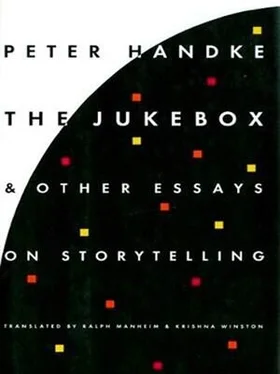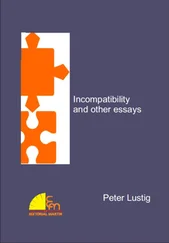When I look up, the sky is a vault. What did “snow cloud” mean? Rich whiteness with a blue cast. Cracking hazelnuts in the palm of my hand, three of them. In Greek there used to be a word for “I am,” which was simply a long-drawn-out “O”; it occurred in such sentences as “While I am in the world, I am the light of the world.” And the word for what just passed through the cypress tree was: “lightwave.” Look and keep looking with the eyes of the right word. And it began to snow. It is snowing. Il neige. To be silent. There was silence. He was silent in the sign of the dead. One should not say: “He (she) blessed the temporal world” (He [she] passed away) but: “He, she, the dead, bless the temporal world for me, provided I leave them alone.” And at the same time wanting to stammer: he wanted to stammer. In the suburbs everything is supposedly so “individual” (a suburbanite speaking). The one-legged stance of the garbage collector at the back of his truck. The bumps placed on the roads at regular intervals were called “decelerators.” A single day may not have been sufficiently far-reaching as a model; perhaps it was a model only to itself — which gave pleasure? During the lunch break I help the roofers carry slats down from the ridge. Shouldn’t I have stayed home all day, doing nothing but “dwelling”? Bring about a successful day by pure dwelling? To dwell, to sit, to look up, to excel in uselessness. What did you do today? I heard. What did you hear? Oh, the house. Ah, beneath the tent of my book. But why are you going out now, instead of staying in the house, where you were in your place with your book? Because what I’ve read — I want to digest it out of doors. And look at the corner of the house, which is called “Travels”: a small suitcase, a dictionary, hiking shoes. The ringing of bells in the belfry of the village church: the pitch is just right for this noon hour, and up here in the dark dormer window all that can be seen of them is a whirring as of bicycle spokes. Deep within the earth, there are occasional tremors, the so-called slow tremors, and for a while, so it is said, the planet reverberates with them: “the bell movement,” the ringing of the earth. The silhouettes of a man and a child with a back satchel sway in the railroad underpass, as if the man were riding on a donkey. According to Goethe, life is short but the day is long, and I seem to remember Marilyn Monroe singing a song that went: “One day too long, one life too short …” and another: “Morning becomes evening under my body.” Let the quick ellipse described by the last of the leaves of the plane tree in falling provide the line for the ending of my attempted successful day — Abbrevia- tion! Hogarth’s Line of Beauty is not actually engraved in the palette; it is stretched over it like a curved rope or a whiplash. The successful day and succinctness. (And, alongside it, the desire to postpone the end — as though I, I in particular, could learn more from my essay with each passing day.) The successful day and joyful expectation. The successful day and the discoverer’s aberrations. Morning a still life — afternoon a muddle: a mere pseu-dolaw? Don’t let yourself be ruled by these daily pseudo-laws. And once again St. Paul. For him “the day” is the Day of Judgment — and for you? The day of measurement; it will not judge, but measure you; you are its people. Who here is talking to whom? I’m talking to myself. The dead silence of the afternoon. Nevertheless, the sound of children running, heard through the wind. And high up there the flower heads of the plane trees are still dangling: “his (her) heart is in it” (from the French). And at any moment, in the rustling of the withered dwarf oaks, now, for instance, I become you. What would we be without that rustling? And what word goes with it? The (toneless) yes. Stay with us, rustling. Keep pace with the day — speak in cadence with the day (homology). What became of that day on the curve high above all Paris, between Saint-Cloud and Suresnes, not far from the Val d’Or station. It hung in the balance. The bright-dark shimmer that day when the swallows veered in the summer sky, and the black-white-blue moment now: the magpies and the winter sky. The S-line again, a few days ago, on the shoulder, neck, and throat of John the Evangelist at the Last Supper over the portal of Saint-Germain-des-Près, his whole trunk lies there on the table next to the Lord Jesus — for, like the other stone figures, he had been beheaded by the Revolution. The successful day and again history’s glorious forgetfulness: instead, the endless lozenge pattern of human eyes — on the streets, in the corridors of the Métro, in the trains. The gray of the asphalt, the blue of the evening sky. The shakiness of my day, the solid and enduring? Set your footprint upon the snow of the station platform beside the print of a bird’s foot. A hard day once began to teeter when a single raindrop struck my inner ear. The shoe brush on the wooden stairs at sunset. A child writing its name for the first time. Keep going until the first star. Van Morrison in his song doesn’t sing about “fishing in the mountains,” but “out all day,” about bird watching. He lets his tongue sing, and barely begun, his song is at an end. The moment of the mud-spattered forester’s car in the row of clean cars. The doors of the forest open with a creak. Revolving door of a successful day: in it, things as well as people flare up as beings . The successful day and the will to divide it. Constant, wild obligation to be fair. Oh, hard day! Successful? Or “saved”? Unexpectedly, still in the dark, the thrust of joy in carrying on. Yes, a modified word — a proof correction that stands for the day: “thrust” instead of your usual “jolt.” Stop on your night walk: the path is brightening — for once you can say “my path”—and increasing awareness of secrecy, “behold, she comes with the clouds,” comes with the wind. Triad of the screech owl. Blue moment of the boat in one woodland pond, black moment of the boat in the next pond. For the first time in this suburb, behind the Heights of the Seine that hide the lights of Paris, caught sight of Orion high in the winter night, behind it parallel columns of smoke from factory chimneys, and under it the five stone steps, leading up to a door in a wall, and Ingrid Bergman in Stromboli, who collapses after an almost fatal night on the black, rocky slopes of the volcano, revives at sunrise, and can’t get over her amazement. “How beautiful! What beauty!” In the 171 night bus a lone passenger, standing. The burned-out telephone booth. Collision between two cars at the Pointe de Chaville: from one of them leaps a man with a pistol. Glaring television lights in the front windows of the Avenue Roger Salengro, the house numbers on which go up to over 2000. The thunder of the bombers taking off from the military airfield in Villacoublay, just beyond the wooded hills, more frequently from day to day with the approach of war.
“But now you’re losing the line completely. Go home to your book, to writing and reading. To the original texts, in which for example it is said: ‘Let the word resound, stand by it — whether the moment be favorable or not.’ Have you ever experienced a successful day? With which for once a successful moment, a successful life, perhaps even a successful eternity might coincide?”
“Not yet. Obviously!”
“Obviously”?
“If I had experienced anything even remotely resembling that, I imagine, I should have to fear not only a nightmare for the following night but the cold sweats.”
“Then your successful day is not even an idea, but only a dream?”
“Yes, except that instead of having it, I’ve made it in this essay. Look at my eraser, so black and small, look at the pile of pencil shavings below my window. Phrases and more phrases in the void, to no good purpose, addressed to a third incomprehensible something, though the two of us are not lost. Time and again in his epistles, not to the congregations, but to individuals, his helpers, Paul, from his prison in Rome, wrote about winter. For example, ‘Do try to get here before winter. And when you come, bring the cloak I left with Carpus at Troas …’”
Читать дальше












